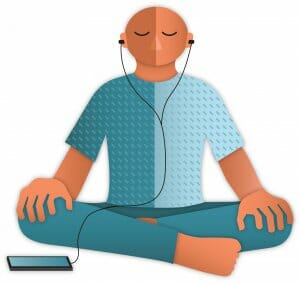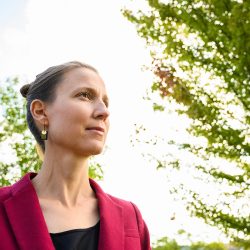Five Minutes to Mental Health
The UW Healthy Minds Program app helps students meditate via podcast.
“Close your eyes,” says the voice of Cortland Dahl PhD’16, research scientist at the UW Center for Healthy Minds. “Take a few slow breaths. Feel the air as it moves in and out of your body. Picture someone you care about.”
Many new students listened to Dahl as they worked out, walked to class, or cleaned up their dorm room in September, taking part in the 30-Day Badger Well-Being Challenge. Incoming freshmen, returning sophomores, and transfer students were encouraged to sign up for the Healthy Minds Program app, which led them through a series of daily five-minute podcast meditations.
Mick Miyamoto PhD’93, special projects coordinator for student affairs in the Dean of Students Office, issued the challenge to strengthen students’ focus and resiliency. The center developed the free app in response to rising levels of anxiety, depression, and distractedness. These mental health issues remain prevalent, and COVID-19 continues to be a major disruption, so the meditation program seemed especially salient for students returning to a new normal on campus this fall.
The Healthy Minds Program focuses on four pillars that are vital to well-being: awareness, connection, insight, and purpose. Relating to people in a healthy way, exercising compassion, celebrating kindness, and finding purpose in everyday activities are all important aspects of well-being. Miyamoto likens resiliency and a focused mind to a life preserver in a world that still struggles with COVID-19 fallout, mental health, sexual assault, and racism. “We’re not able to recede the waters or drain the pool yet,” he says, “but we’re going to help you survive and then eventually keep working.”
Richard Davidson, director of the Center for Healthy Minds, feels the same way about the need for a community effort. “What’s at stake is nothing short of the flourishing of humanity and the planet,” he says. “It is absolutely critical that we get along more cooperatively and more compassionately.”
Published in the Winter 2021 issue




Comments
No comments posted yet.